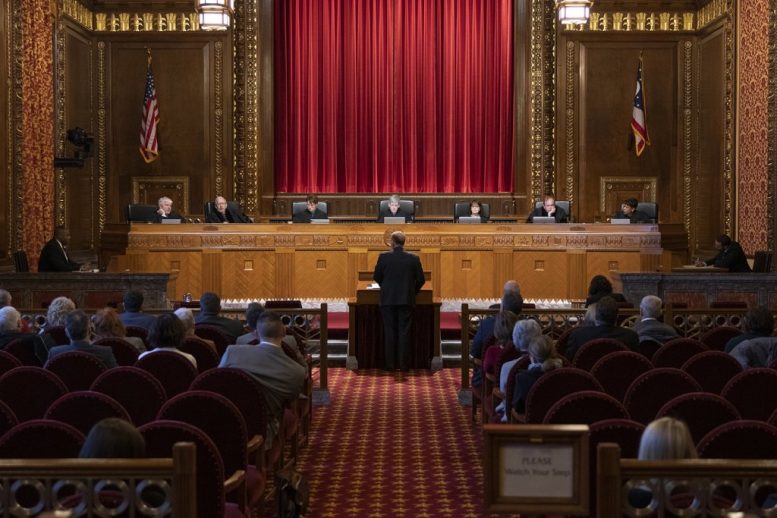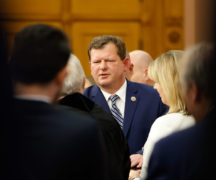By Susan Tebben
The roles Ohio Supreme Court justices should avoid are just as important as the roles they do play, according to justices and the judges vying for two spots on the state’s highest court.
In a recent forum hosted by the Ohio Debate Commission, Justice Sharon Kennedy, Justice Judith French, and their challengers, Cuyahoga Court of Common Pleas judge John P. O’Donnell and Tenth District Court of Appeals judge Jennifer Brunner, came together to talk about the three branches of government, impartial justice and inequity in the legal system.
The two statewide races — the only statewide races apart from the race for president — could swing the balance of power on the court, which is currently controlled by Republicans 5-2, including incumbents French and Kennedy.
The justices and judges agreed that the Supreme Court should be a branch separate from the other two branches, but especially from the legislative branch.
“The judiciary has no business telling the legislature what law it should make, the judiciary has little business telling the executive branch how to enforce those laws, but the judiciary must, when one or both of those branches exceeds its constitutional bounds, step in,” said O’Donnell, who is running to replace Kennedy. “If we don’t, we’re not doing our job.”
Kennedy said the role of judges is to serve as “independent bodies” who serve in the Supreme Court to apply the law as written, and only intervene in the General Assembly’s business if the action reaches unconstitutionality.
Unconstitutional laws came up specifically in a question about the state Supreme Court’s 1997 DeRolph decision, in which the court ruled that the state’s public education funding formula was not lawful.
“The DeRolph decision that declared school funding unconstitutional is a thorn in Ohio’s side,” Kennedy said.
But it is still up to the legislature to fix the problems, she said.
“To me, it is the province of the General Assembly to start again and write the law; it is not the province of the Supreme Court,” Kennedy said. “Ours is not the place where law is made.”
That case was decided decades ago, and public education funding has been ruled unconstitutional three other times since. Just recently, a bipartisan bill to address some issues first raised in DeRolph was brought back up by one of its cosponsors.
O’Donnell argued that the case “is not going to be revived,” and another argument about the constitutionality of public school funding would have to come from a new court case.
The judges and justices also agreed that a statewide sentencing database would bring a better sense of accountability and transparency to the justice system. French brought up work being done by the Ohio Criminal Sentencing Commissionseveral times, particularly in talking about racial inequities and inequities in the state’s bail bond system.
“The whole purpose of our bail system is to make sure that that defendant who’s been charged comes back,” French said. “We want to ensure that the trial courts are using the least restrictive means to make sure that the individual comes back.”
Brunner likened a sentencing database to a system created under her tenure as Ohio’s Secretary of State, which tracked the quality of life for Ohioans.
“If you want to manage it, you have to measure it. If you want to measure it, you have to define it,” Brunner said.
The judges broke away from the justices on the subject of a “clean campaign agreement” the Ohio State Bar Association’s Campaign Advertising Monitoring Committee put together as a pledge from the candidates that they would be “personally responsible” for the content of “all statements and campaign materials” relating to their judicial campaigns.
That pledge also charged the OSBA committee with “reviewing judicial advertising” and charged the candidates to “publicly disavow advertisements that impugn the integrity of the judicial system,” the other candidates or that “erode public trust” in the judiciary.
O’Donnell and Brunner both declined to sign the pledge, saying their judicial ethics were a part of their campaign, as well as their independence as candidates and legal professionals.
“I’m a judge, and I’m running to be a justice of the Ohio Supreme Court,” O’Donnell said. “To do so, I have to be confident in my judgment, so I will exercise my own judgment and denounce, if I see fit, some third-party advertising that might hypothetically appear.”
On the topic of money in Supreme Court races, which are not considered partisan races in the state, the judges and justices said money was a “necessary evil” in any campaign for elected office.
“As long as we are going to have judicial elections, we are going to be raising money to actually put forth our candidacy and our First Amendment voice in explaining to the voters why you are the better candidate,” Kennedy said.
As the incumbents, both Kennedy and French were asked about appearing at partisan events as justices on the court, and navigating personal biases. French and Kennedy both said it was appropriate to speak at partisan events as long as they were not speaking on behalf of a party platform.
French also approved of an example given by moderators in which the Ohio Business Roundtable — a group of Ohio CEOs led by former Republican legislator Pat Tiberi — pushed CEOs to send out emails encouraging employees to tie job stability to the layout of the Ohio Supreme Court.
“Ohio Business Roundtable and the CEOS that are encouraging their employees to vote for me, I applaud that effort,” French said. “I believe that is a correct statement that having me remain on the Ohio Supreme Court is better for the stability of the court.”
As the justice system continues to adapt to social distanced court proceedings and online hearings, the judges and justices said the COVID-19 pandemic has brought out creativity and innovation in the judiciary, something that will be necessary as the pandemic continues, and as more permanent accessibility to the justice system is demanded.
“The increased use of video, the increased use of broadband, and the increased access to broadband especially in the rural areas, will be key to providing this for the future,” Brunner said.
***
Profiles: Ohio Supreme Court seats up in contested races
Two seats on the Ohio Supreme Court are up in November’s election. The six-year terms on the state’s highest court are held by two longtime incumbents, and contested by two judicial veterans with experience vying for seats on the court or governmental positions.
French v. Brunner
Judith French
French has been a justice with the Ohio Supreme Court since 2013. She was appointed to the post by then-Gov. John Kasich after Evelyn Lundberg Stratton retired.
Before joining the high court, French spent eight years as a judge with Ohio’s Tenth District Court of Appeals.
In the years preceding her tenure as a judge, French served as chief legal counsel for former Gov. Bob Taft, following five years at the Ohio Attorney General’s Office and a four-year stint as deputy director of legal affairs for the state’s Environmental Protection Agency.
She started her legal career in 1988 as an associate at Porter, Wright, Morris & Arthur specializing in environmental law, until 1992, when she spent a year as associate counsel for office manufacturing company Steelcase, Inc.
She was appointed to the Federal Appellate Rules Committee in 2015, by U.S. Supreme Court Chief Justice John Roberts.
French is a native of Mahoning County.
Jennifer Brunner
A former Ohio Secretary of State, Brunner is currently a judge on the state’s Tenth District Court of Appeals. Brunner spent five years as a judge in the Franklin County Court of Common Pleas.
After leaving the Secretary of State’s Office, Brunner went back into private practice, for which she has a total of 17 years experience.
The Springfield native also ran for U.S. Senate in 2010.
Kennedy v. O’Donnell
Sharon Kennedy
Kennedy has been on the bench of the Ohio Supreme Court since 2012. She defeated Yvette McGee Brown for the seat vacated by Justice Maureen O’Connor after she was elected chief justice.
A former Hamilton Police Department officer, Kennedy practiced on her own before serving as magistrate and officer for Butler County courts, including the juvenile court.
In 1995, she began serving as special counsel for former Attorney General Betty D. Montgomery, while also serving as disciplinary counsel for Lodge 38 of the Fraternal Order of Police of Ohio.
John P. O’Donnell
O’Donnell is currently a judge in the Cuyahoga County Court of Common Pleas, a position he’s held since 2007. He was also a judge in the county court system from 2002 to 2005, before joining Terrence J. Kenneally & Associates as a private-practice attorney.
O’Donnell was an insurance adjuster with Aetna before he began his legal career as a private-practice attorney in 1993. He worked as in-house counsel for the Cincinnati Insurance Companies before starting his first judgeship in Cuyahoga County.
O’Donnell previously ran for a seat on the Ohio Supreme Court in 2016, but narrowly lost the race to Justice Patrick Fischer. In 2014, he also unsuccessfully ran for Justice Judith French’s seat.






